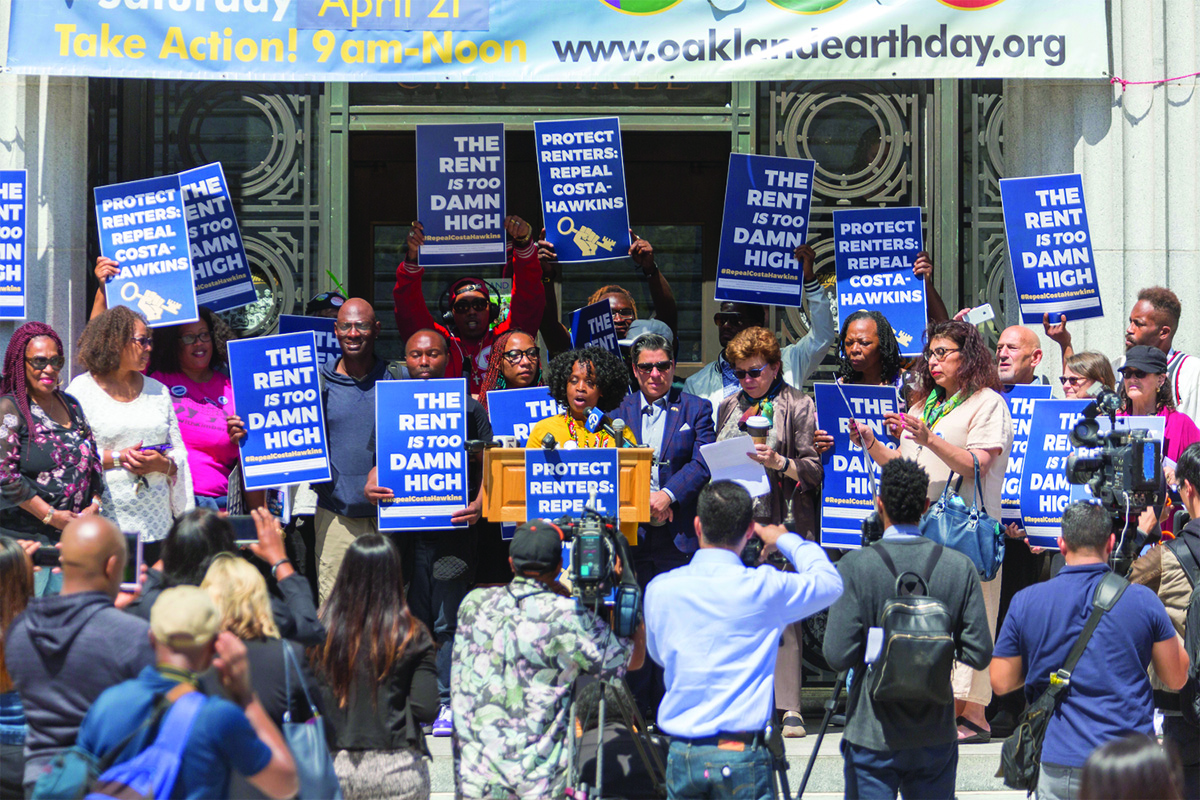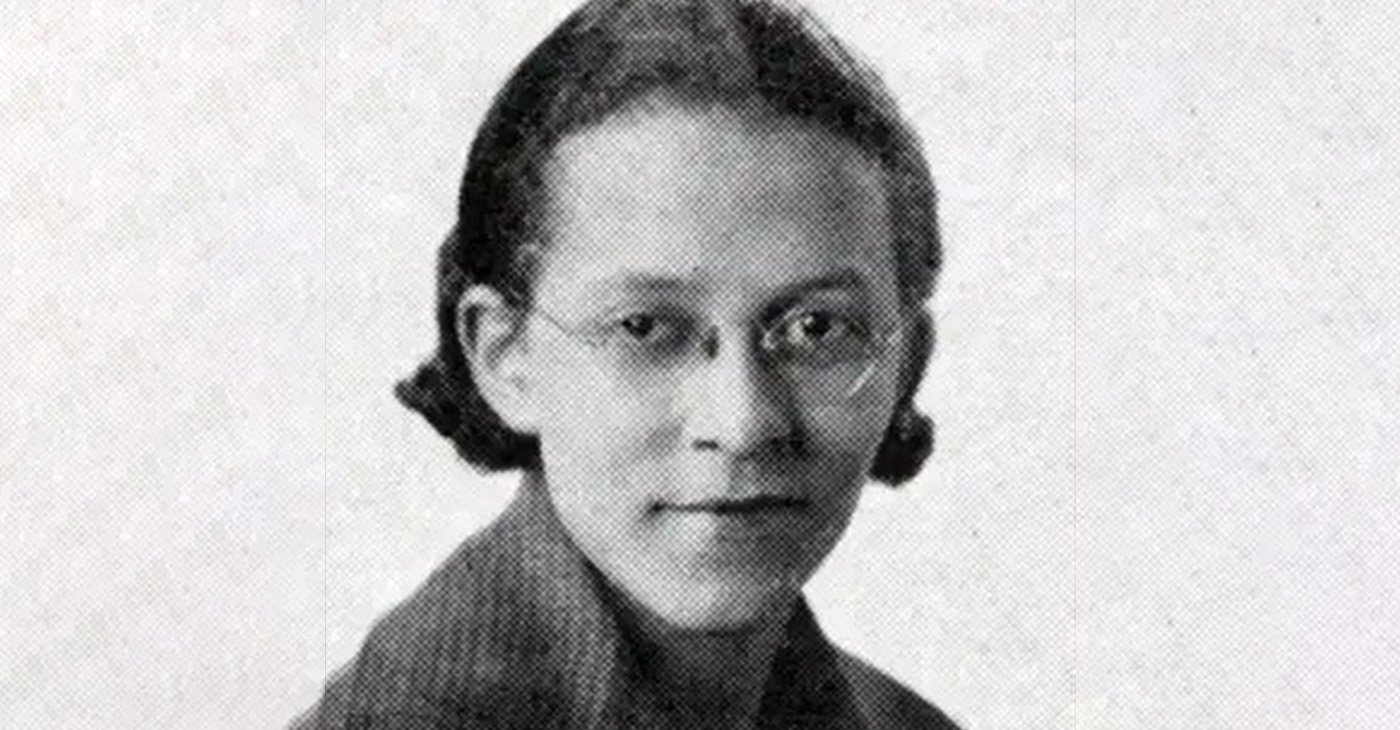Housing
Renters Rights Advocates Support Affordable Housing Act

Carroll Fife, a longtime Oakland activist, speaks at a rally in support of proposition 10, the Affordable Housing Act, which would repeal the 1995 Costa-Hawkins Rental Housing Act. Photo courtesy of voteyesonprop10.org.
California voters will decide this November on Proposition 10, a statewide ballot initiative that would repeal the 1995 Costa-Hawkins Rental Housing Act.
“Costa-Hawkins repeal is one of the primary goals of the renters’ rights movement,” said Shanti Singh, communications and development coordinator for Tenants Together, on Wednesday’s “Your Call” radio show on KALW.
“We pushed very hard for that to happen with Assembly Bill 1506, (but) it did not pass committee. So now we’re taking it directly to the voters because we know that is what California’s renters want,” said Singh.
Costa-Hawkins sets restrictions statewide on rent control. It exempts from rent control units built (or heavily renovated) after 1995, as well as single-family homes, and condos.
There has been a growing movement for the repeal of Costa-Hawkins, which could allow local governments to create their own rent control laws. Several tenants’ rights organizations, including Tenants Together, endorsed a similar bill last year introduced by Assemblymembers Richard Bloom, David Chiu, and Rob Bonta. It failed early on in the hearing process.
Bonta tweeted shortly after the vote: “I’m disappointed we came up one vote short on AB 1506 to repeal Costa Hawkins, but I’m grateful for the strong show of support at today’s hearing. Every great movement has a beginning, middle and end. We are in the middle!”
Activists who showed at the State Capitol building in January to support Assembly Bill AB1506 described Costa Hawkins in a press release: “It effectively limits local jurisdictions’ ability to address their specific housing issues and prevents them from stabilizing local communities,” the release read.
This year it will be up to the voters to decide. The California Democratic Party has endorsed Prop. 10, also known as the Affordable Housing Act.
The proposition is backed by over $12 million from supporters, including one major contribution by the AIDS Healthcare Foundation.
The anti-Prop 10 opposition committees have over double that funding, from several real-estate companies including Western National Group, Essex Property Trust, and Equity Residential.
Opponents of the ballot initiative say the repeal would dissuade future developments, preventing more affordable housing projects from being built if landlords don’t find the industry sustainable or lucrative enough.
But proponents say that under Costa-Hawkins, it’s too easy for landlords to take advantage and displace tenants, “When I first moved into this home, the rent was $1850. Four years later my most recent notice is taking my rent to more than $3000,” said Blackstone/Invitation Homes tenant and ACCE member Renita Barbee living in Los Angeles. “My landlord Stephen Schwarzman is worth $12.7 billion while I’m on the verge of losing my home. Our elected officials need to prioritize homes for families like mine instead of unlimited profits for corporate giants like Invitation Homes.”
Activism
We Fought on Opposite Sides of the Sheng Thao Recall. Here’s Why We’re Uniting Behind Barbara Lee for Oakland Mayor
Today, we are coming together to do all we can to make sure Barbara Lee is elected Mayor in the April 15 Oakland special election. Here’s why. Now more than ever, Oakland needs a respected, hands-on leader who will unite residents behind a clear vision for change. The next mayor will have to hit the ground running with leaders and stakeholders across our political divide to get to work solving the problems standing in the way of Oakland’s progress. Job No. 1: improving public safety. Everyone agrees that all Oaklanders deserve to feel safe in their neighborhoods. But sadly, too many of us do not.

By Robert Harris and Richard Fuentes
Special to The Post
The City of Oakland is facing a number of urgent challenges, from housing and public safety to a pressing need for jobs and economic development. One of us, Robert Harris, supported the November recall vote that removed Mayor Sheng Thao from office. Meanwhile, Richard Fuentes believed the recall was the wrong strategy to tackle Oakland’s challenges.
Today, we are coming together to do all we can to make sure Barbara Lee is elected Mayor in the April 15 Oakland special election. Here’s why.
Now more than ever, Oakland needs a respected, hands-on leader who will unite residents behind a clear vision for change.
The next mayor will have to hit the ground running with leaders and stakeholders across our political divide to get to work solving the problems standing in the way of Oakland’s progress.
Job No. 1: improving public safety. Everyone agrees that all Oaklanders deserve to feel safe in their neighborhoods. But sadly, too many of us do not.
During her three decades in the state Legislature and Congress, Lee made public safety a priority, securing funding for police and firefighters in Oakland, delivering $15.8 million in community safety funding, and more. Today, she has a plan for making Oakland safer. It starts with making sure police are resourced, ready, and on patrol to stop the most dangerous criminals on our streets.
Oakland residents and business owners are feeling the impact of too many assaults, smash/grabs, retail thefts, and home robberies. Lee will increase the number of police on the streets, make sure they are focused on the biggest threats, and invest in violence prevention and proven alternatives that prevent crime and violence in the first place.
In addition, on day one, Barbara Lee will focus on Oakland’s business community, creating an advisory cabinet of business owners and pushing to ensure Oakland can attract and keep businesses of all sizes.
The other top issue facing Oakland is housing and homelessness. As of May 2024, over 5,500 people were unhoused in the city. Oaklanders are just 25% of the population of Alameda County, but the city has 57% of the unhoused population.
Unhoused people include seniors, veterans, single women, women with children, people who suffer physical and mental illness, unemployed and undereducated people, and individuals addicted to drugs. Some are students under 18 living on the streets without their parents or a guardian. Research shows that 53% of Oakland’s homeless population is Black.
Starting on her first day in office, Lee will use her national profile and experience to bring new resources to the city to reduce homelessness and expand affordable housing. And she will forge new public/private partnerships and collaboration between the City, Alameda County, other public agencies, and local nonprofits to ensure that Oakland gets its fair share of resources for everything from supportive services to affordable housing.
Besides a public safety and housing crisis, Oakland has a reputational crisis at hand. Too many people locally and nationally believe Oakland does not have the ability to tackle its problems.
Lee has the national reputation and the relationships she can use to assert a new narrative about our beloved Oakland – a vibrant, diverse, and culturally rich city with a deep history of activism and innovation.
Everyone remembers how Lee stood up for Oakland values as the only member of Congress not to authorize the disastrous Iraq War in 2001. She has led the fight in Congress for ethics reform and changes to the nation’s pay-to-play campaign finance laws.
Lee stands alone among the candidates for mayor as a longtime champion of honest, transparent, and accountable government—and she has the reputation and the skills to lead an Oakland transformation that puts people first.
The past few years have been a trying period for our hometown.
Robert Harris supported the recall because of Thao’s decision to fire LeRonne Armstrong; her refusal to meet with certain organizations, such as the Oakland Branch of the NAACP; and the city missing the deadline for filing for a state grant to deal with serious retail thefts in Oakland.
Richard Fuentes opposed the recall, believing that Oakland was making progress in reducing crime. The voters have had their say; now, it is time for us to move forward together and turn the page to a new era.
The two of us don’t agree on everything, but we agree on this: the next few years will be safer, stronger, and more prosperous if Oaklanders elect Barbara Lee as our next mayor on April 15.
Robert Harris is a retired attorney at PG&E and former legal counsel for NAACP.
Richard Fuentes is co-owner of FLUID510 and chair of the Political Action Committee, American Federation of State, County, and Municipal Employees (AFSCME) Council 57.
Activism
District Delegates to State Democratic Party Central Committee Meeting Celebrate Election Victory
Delegates and elected officials were excited for the future of the Democratic Party and making its focus on 1) creating more affordable housing, 2) supporting education, 3) helping working families, and 4) protecting the environment and addressing climate change, with a focus on practical and realistic policy efforts that could have a meaningful impact.

By Ben Gould
Special to The Post
Winners of the February 2025 Assembly District Election Meetings (ADEM) for Assembly Districts 14 and 18 met on Sunday, March 16 to discuss priorities for the California Democratic Party convention in Anaheim coming up in May.
The winners for Assembly District 18 are Genice Jacobs, Bobbi Lopez, Shawn Danino, Ben Gould, Zac Bowling, Nate Hanson, Cathy Adams, Sam Gould, Lauren Wilson, Ashlee Jemmott, and former Oakland School Board Director Sam Davis.
The winners for Assembly District 14 are: Sarah Bell, Neil Tsutsui, Hercules Councilmember Dilli Bhattarai, former Berkeley School Board Director Laura Babitt, former Piedmont Mayor Teddy Gray King, and former Albany Mayor Nick Pilch.
They were joined by Oakland Councilmember Janani Ramachandran, Emeryville Councilmember Courtney Welch, and BART Director Victor Flores to help celebrate their victory.
Delegates and elected officials were excited for the future of the Democratic Party and making its focus on 1) creating more affordable housing, 2) supporting education, 3) helping working families, and 4) protecting the environment and addressing climate change, with a focus on practical and realistic policy efforts that could have a meaningful impact.
Arts and Culture
Beverly Lorraine Greene: A Pioneering Architect and Symbol of Possibility and Progress
Greene graduated from the University of Illinois at Urbana-Champaign in 1936 with a degree in Architecture — a remarkable accomplishment for an African American woman at the time. She was never discouraged by the racial and gender discrimination that saturated her field.

By Tamara Shiloh
In the mid-20th century, Beverly Lorraine Greene was recognized as the first African American woman licensed to practice architecture in the United States.
Greene was born on Oct. 4, 1915, in Chicago during an era when opportunities for African Americans, particularly women, were severely limited.
Her parents, James and Vera Greene, were deeply invested in her education, instilling in her a belief in the power of intellect and perseverance. She grew up during the Great Migration that transformed Chicago starting in 1900.
Greene graduated from the University of Illinois at Urbana-Champaign in 1936 with a degree in Architecture — a remarkable accomplishment for an African American woman at the time. She was never discouraged by the racial and gender discrimination that saturated her field.
Greene continued her education, earning a master’s degree in City Planning and Housing in 1937, also from the University of Illinois. Her ambition was not merely to design structures but to shape spaces that fostered equity and community. In 1942, she became the first African American woman licensed as an architect in the United States, obtaining her credentials in Illinois. This groundbreaking achievement, however, did not translate immediately into job opportunities.
Early in her career, she faced significant discrimination from firms unwilling to hire a Black woman. However, her determination never wavered. In 1945, Beverly moved to New York City, a place she believed could offer broader professional opportunities.
She joined the architectural department of the New York City Housing Authority, focusing on affordable housing projects. Her work during this time reflected her commitment to using architecture as a tool for social justice, ensuring that marginalized communities had access to well-designed, dignified living spaces.
Greene’s talents soon drew the attention of prominent firms. She was hired by Isadore Rosenfield, a respected architect known for designing hospitals. She contributed to the design of healthcare facilities, including the modernization of Harlem Hospital. Her portfolio expanded in collaboration with architectural personalities such as Marcel Breuer and Edward Durell Stone.
Notably, she worked on the prestigious UNESCO headquarters in Paris — a landmark project that brought her skills to an international stage. Her involvement underscored her ability to navigate the intricacies of large-scale, global projects, proving that her talents transcended the limitations society sought to impose.
Greene’s career was tragically cut short when she passed away unexpectedly in 1957 at the age of 41. Though her life was brief, her impact was profound. She shattered entrenched barriers, paving the way for future generations of Black architects and women in the field.
-

 #NNPA BlackPress4 weeks ago
#NNPA BlackPress4 weeks agoTarget Takes a Hit: $12.4 Billion Wiped Out as Boycotts Grow
-

 Activism3 weeks ago
Activism3 weeks agoUndocumented Workers Are Struggling to Feed Themselves. Slashed Budgets and New Immigration Policies Bring Fresh Challenges
-

 #NNPA BlackPress4 weeks ago
#NNPA BlackPress4 weeks agoBREAKING Groundbreaking Singer Angie Stone Dies in Car Accident at 63
-

 Activism4 weeks ago
Activism4 weeks agoOakland Post: Week of February 26 – March 4, 2025
-

 #NNPA BlackPress4 weeks ago
#NNPA BlackPress4 weeks agoNAACP Legend and Freedom Fighter Hazel Dukes Passes
-

 Arts and Culture4 weeks ago
Arts and Culture4 weeks agoBeverly Lorraine Greene: A Pioneering Architect and Symbol of Possibility and Progress
-

 #NNPA BlackPress4 weeks ago
#NNPA BlackPress4 weeks agoTrump Kicks the Ukrainian President Out of the White House
-

 #NNPA BlackPress4 weeks ago
#NNPA BlackPress4 weeks agoApple Shareholders Reject Effort to Dismantle DEI Initiatives, Approve $500 Billion U.S. Investment Plan

















































